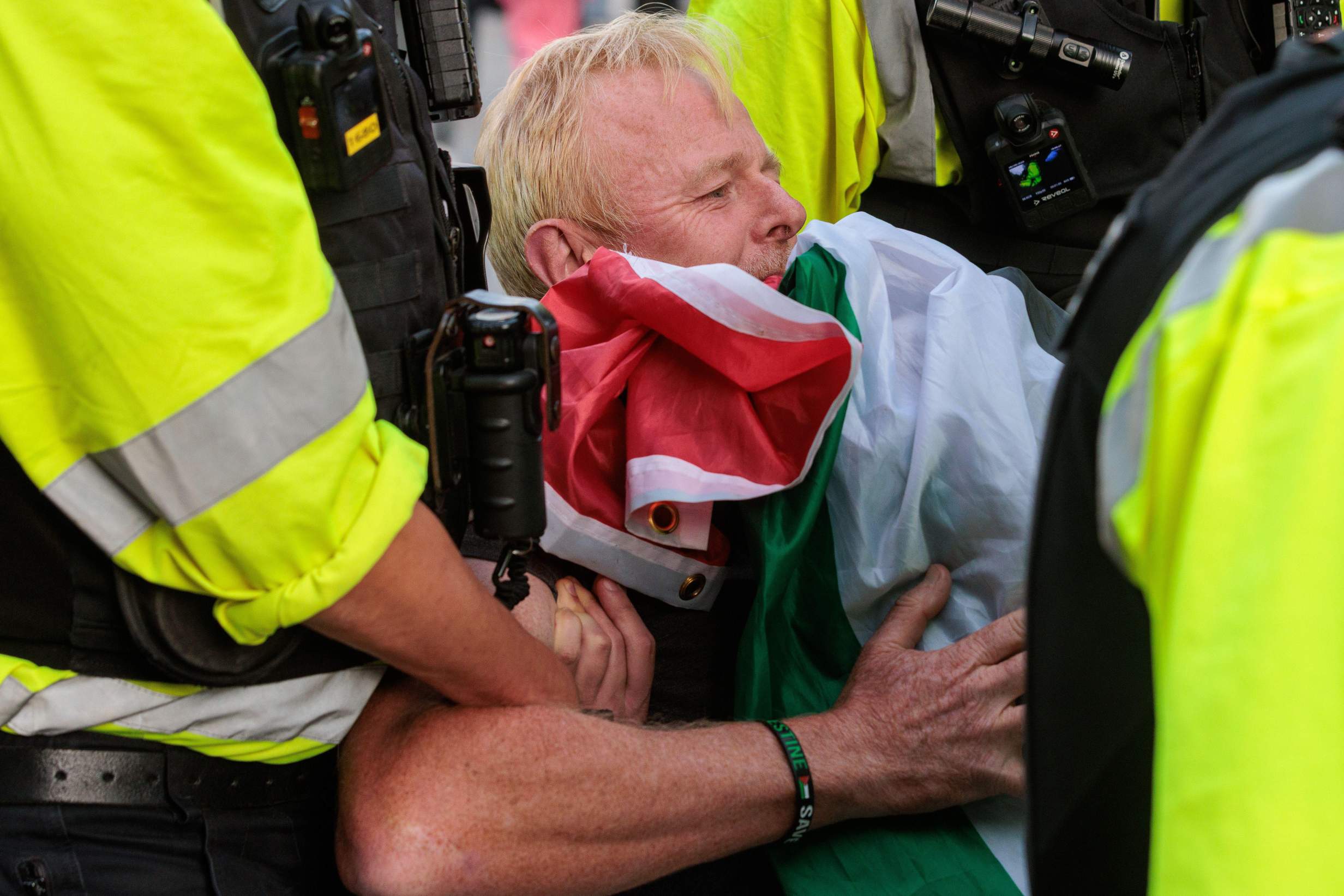
Read our Monthly Magazine
And support our mission to provide fearless stories about and outside the media system
A “mass action” against the Palestine Action ban will take place in Trafalgar Square this Saturday (4th October), with 1,500 people having signed a pledge making to join the action and risk arrest by pledging their support for the banned organisation.
They will, as in previous protests, hold signs saying “I oppose genocide. I support Palestine Action.” Organisers Defend Our Juries believe hundreds more will join the action on the day without registering in advance – making it the largest such protest yet.
Over 1,600 people have been arrested for peaceful sign-holding under the Terrorism Act 2000 since the Palestine Action ban came into effect on 5th July — more than six times the total number of counter-terror arrests in the whole of last year, according to Defend Our Juries. The mass action in Trafalgar Square could therefore see the total number of people arrested so far nearly double.
Responding to Byline Times at a press conference on Wednesday (1st October), Saeed Taji Farouky, a Palestinian filmmaker and journalist, said: “The level of anger, the level of despair amongst the British public, is unlike anything I’ve seen in 30 years of activism for Palestine. So I have no doubt that Defend Our Juries can continue as long as it takes.”
ENJOYING THIS ARTICLE? HELP US TO PRODUCE MORE
Receive the monthly Byline Times newspaper and help to support fearless, independent journalism that breaks stories, shapes the agenda and holds power to account.
We’re not funded by a billionaire oligarch or an offshore hedge-fund. We rely on our readers to fund our journalism. If you like what we do, please subscribe.
“It’s very clear that the government has said they won’t back down. It’s very clear that Defend Our Juries have said they won’t back down—not only about Palestine in particular, but about the foundations of British democracy, about the right to freedom of speech in this country.”
He added: “Defend Our Juries plan to continue the protests and escalate in terms of numbers, if that’s necessary.”
And the Palestinian activist believes that if Defend Our Juries was banned or stopped their campaign, “you’d still see 1,500 to 2,000 people show up at Parliament Square once a month, taking action.”
“It has become almost an autonomous movement in itself. It’s a bottom-up civil disobedience movement that is more steadfast than anything I’ve seen in years in this country.”
Martin Cavanagh (PCS Union National President) also attended the press conference. He told a clutch of reporters: “We have been pushing [for unions] to attend the general Palestine protests. We’ve been pushing the trade union movement to take a far more proactive and more vocal stance over the last two years.
“We were there at the very beginning—on day one, ourselves and Unite were the only two trade unions represented at that very first national demonstration, and it has been growing since.”
Asked if he believed union chiefs should risk arrest by attending, he added: “Are we as a union pushing general secretaries to take part in the action? The answer is that unions and general secretaries will make their personal choice about what action they can take in pursuit of getting the government to stop the arms sales.”
The Met Police has been contacted for comment.
Defend Our Juries argues Palestine Action was banned “not because it posed any threat to the public, but because it threatened the profits of the arms companies enabling Israel’s genocide.” Arms firms were among those recently revealed to have lobbied for the group’s proscription.
A DOJ spokesperson added: “It’s nothing short of a scandal that thousands of people are being arrested – from vicars and priests to students and retired healthcare workers – as our fundamental rights to free speech and protest have been stripped away.”
They argued the large-scale protests have become a “Poll Tax moment” for the Labour Government.
Labour party conference in Liverpool also saw arrests over Gaza, with it reportedly taking police nine hours to arrest [around 60] of 100 protesters at the conference gates.
The spokesperson added: “If they can’t enforce the ban on their own doorstep, how will they be able to respond to the biggest act of mass civil disobedience in Trafalgar Square this weekend?”
A judicial review of Palestine Action’s proscription has been approved, with the judge expressing concern about the “chilling effect” on freedom of speech.
However, the government is attempting to block the judicial review before it proceeds, arguing Palestine Action should use the Prescribed Organisation Appeal Committee (POAC) instead. A successful POAC appeal, however, would not render unlawful the previous 1,500 or so arrests over the ban.
On the whole, Scottish police forces have chosen not to arrest Palestine Action protesters since the ban, in contrast to Liverpool and London forces.
Despite 30 Palestine-related motions being struck down, Unison and other unions successfully passed an emergency motion urging Labour to brand Israel’s actions in Gaza a “genocide” and demand an arms embargo on Israel. The Government is likely to ignore it.
The PCS Union, representing around 200,000 UK civil servants, reports Home Office staff in the “double figures” raising concerns about administering the PA ban.
The Trades Union Congress unanimously passed a motion in September condemning the proscription and supporting deprescription, arguing that condemning genocide is not terrorism.
DOJ estimates that 200-300 people have been arrested multiple times and will breach bail conditions to protest again, including an 89-year-old woman and one person arrested five times previously.
Award-winning poet Alice Oswald, who was arrested over Palestine Action sign-holding in August, described the proscription as “disturbing misuse of UK counter-terrorism laws”.
At the press conference, spokespeople reported that many officers appeared “confused” and “upset, even tearful” when making arrests.
In July, a Home Office spokesperson justified Palestine Action’s ban by arguing its actions included “attacks” at arms firm Thales in Glasgow in 2022; and “last year at Instro Precision in Kent and Elbit Systems UK in Bristol.”
“The attack on the Thales defence factory in Glasgow, caused over £1 million worth of damage to parts essential for submarines. Staff fled for safety as pyrotechnics and smoke bombs were thrown in evacuation areas. Such acts do not represent legitimate acts of protest and the level of seriousness of Palestine Action’s activity has met the test for proscription under the Terrorism Act 2000,” the Home Office said.
Got a story? Get in touch in confidence on josiah@bylinetimes.com


